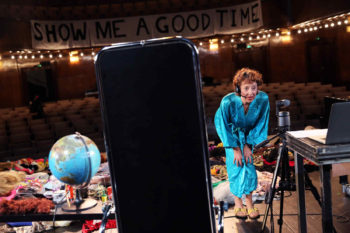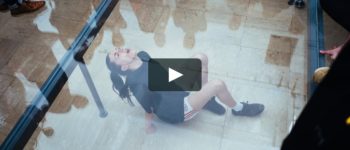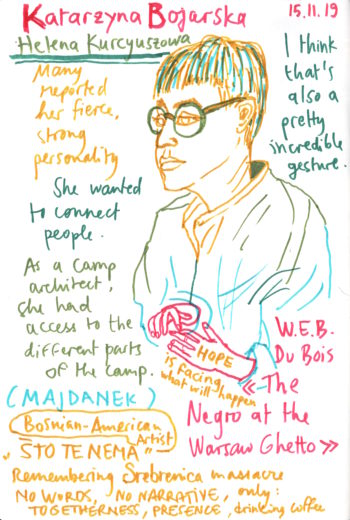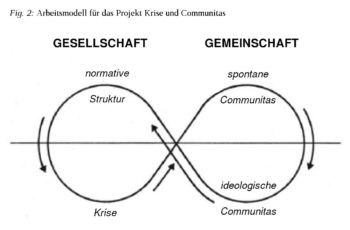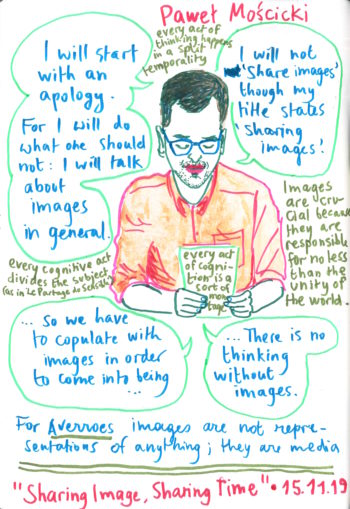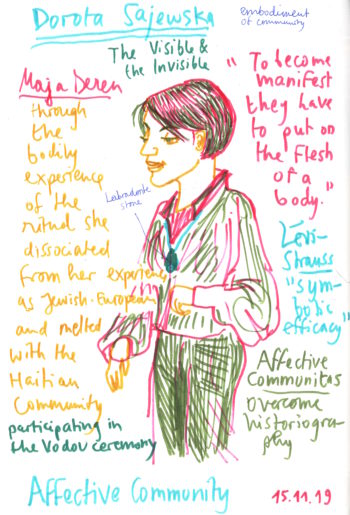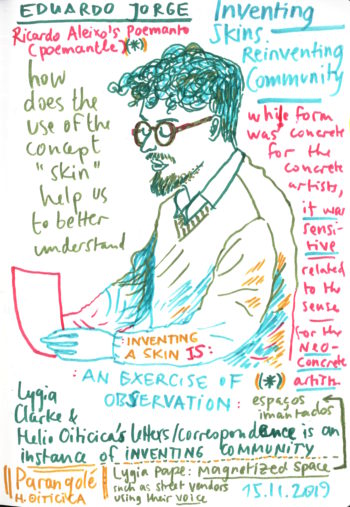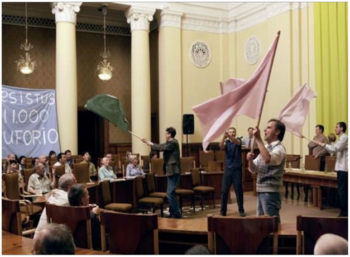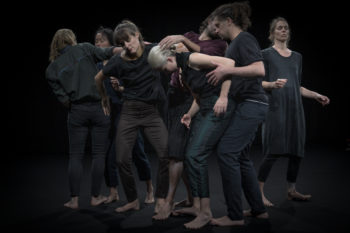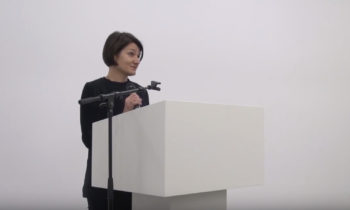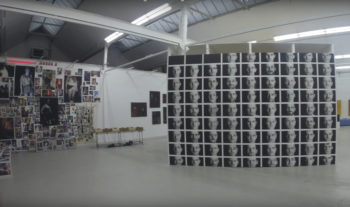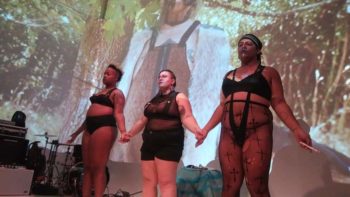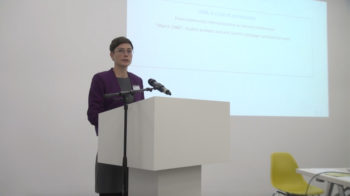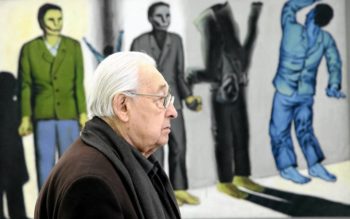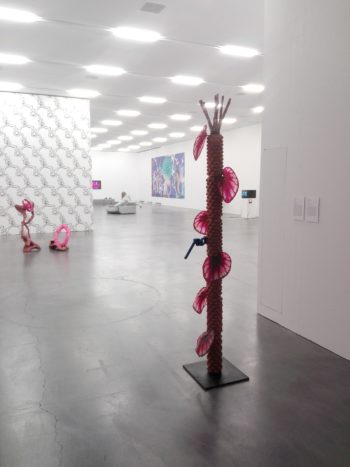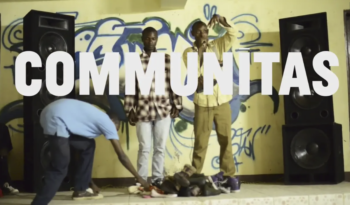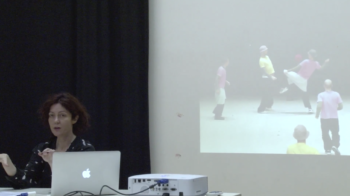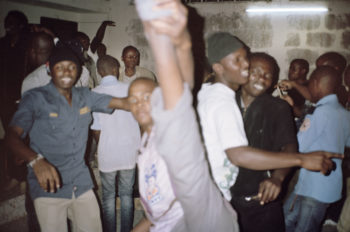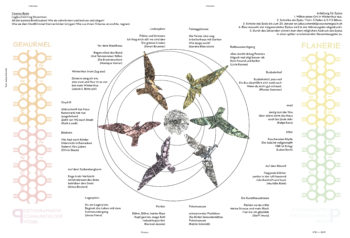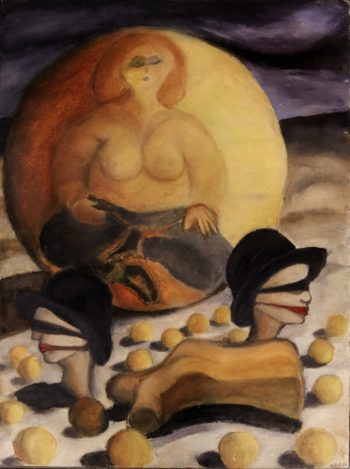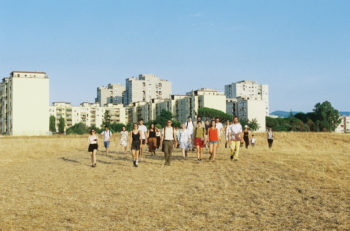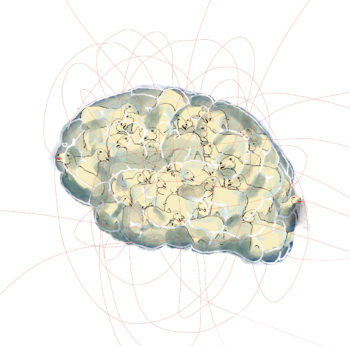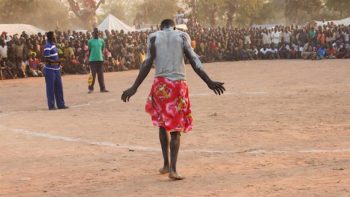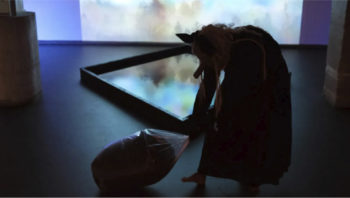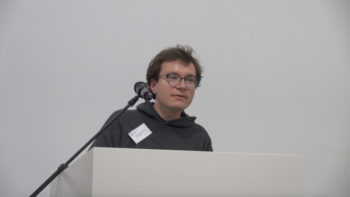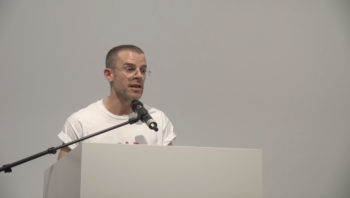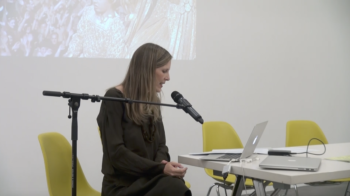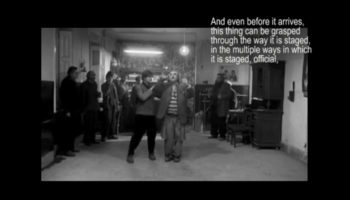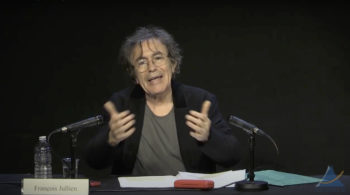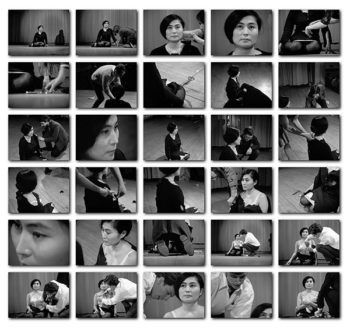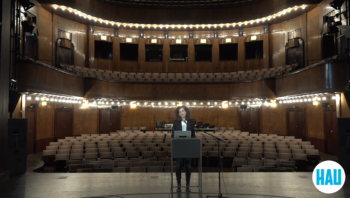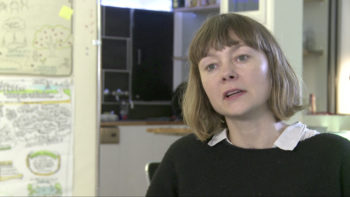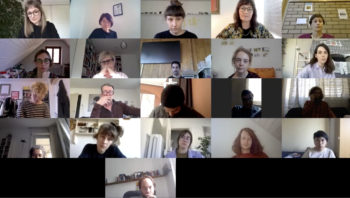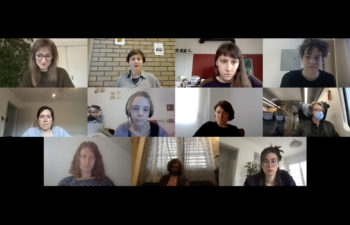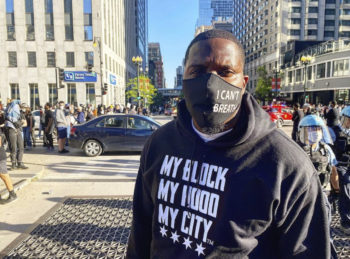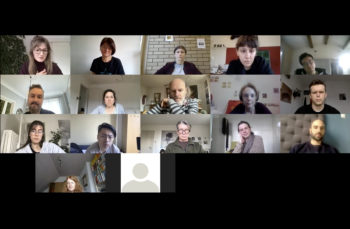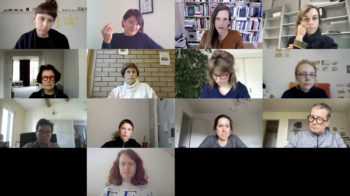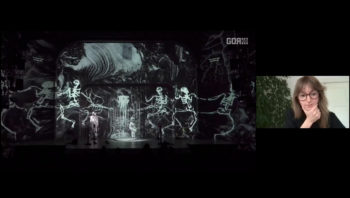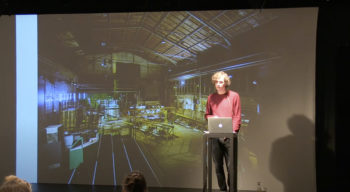Parallelschaltung – eine Reaktion auf Gob Squads “Show me a good Time”
Text: Nina Seiler
Mar 21st 2021
«Thank you cables» – ein Ausspruch, der zwar unerwartet kommt, aber kaum treffender für die Zeit von Corona-Lockdowns sein könnte. Wo wären wir denn ohne die Kabel? Ohne technologischen Support wären wir nicht nur physisch, sondern tatsächlich sozial isoliert. So aber können wir – zumindest viele von uns – immer noch kommunizieren, uns hören und […]
Read more
Communitas: Globale Problemlösung oder unmögliche Theorie?
Text: Monika A. Ciemięga
Feb 23rd 2021
Der Communitas-Begriff ist für das Verständnis und die Analyse von Kultur unabdingbar. Jeder Mensch und jede Kultur ist von Beziehungen geformt und umgeben – in einer Communitas könnten diese Beziehungen zahllose Krisen verhindern. Ist eine globale Gemeinschaft vorstellbar, die in egalitärer Entscheidungsfindung globale Probleme löst und abwendet? Und kann der Begriff dabei helfen, globale Krisen und Beziehungen besser zu verstehen? Ein Essay.
Read more
Zusammenkunft in der totalen Vereinzelung? Ein Essay über die Spuren einer Gemeinschaft in der Performance Faust von Anne Imhof
Text: Julian Obertopp
Feb 1st 2021
Ist unter den Voraussetzungen einer permanenten und unmittelbaren Verwertung von Körpern, kulturellen Praktiken und Kommunikation Gemeinschaft überhaupt noch denkbar, geschweige denn realisierbar? Welche Weisen des Widerstandes lassen sich finden, in einer Situation, welche von einer nicht endenden Verdinglichung menschlicher Beziehungen strukturiert ist? Anhand der Performance «Faust» von Anna Imhof denkt Julian Obertopp über die Konzepte von Gemeinschaft nach.
Read more
Nur Augenblicke. Politische Potenzialität des Stillstands im Bewegungsbild
Text: Miloš Lazović
Feb 18th 2021
Wie können die Menschen aus dem einfachen Volk im filmischen Bild nicht als eine amorphe Masse, sondern als eine Gemeinschaft erfahren werden? Diese Frage erörterte George Didi-Huberman in seinem Buch «Die Namenlosen» – Miloš Lazović greift in seinem Essay Didi-Hubermans Beispiel, den Kurzfilm «La Ricotta» von Passolini, auf und untersucht, welche Potentialität im Konzept des Stillstands im Bewegungsbild liegt.
Read more
Divided We Stand or Revolutionary Love in the Making. A lecture by Katarzyna Bojarska
Text: Katarzyna Bojarska
Apr 26th 2020
If as Ernst van Alphen claims, «affect is the opposite of personal: it is social.» What it means is not so much that affects are not owned by individuals but rather, that their very origin is social, they are produced by and in interactions with numerous agent such as other people (their bodies most specifically) […]
Read more
Die Krise-Communitas-Schleife im Kunstkontext. Prämisse
Text: Dorota Sajewska Nina Seiler
Aug 25th 2019
Der schottisch-amerikanische Anthropologe Victor Turner war massgeblich an der konzeptuellen Herausarbeitung des Zusammenhangs von Communitas und Krise beteiligt. Die Communitas als offene, egalitäre und solidarische Gemeinschaftlichkeit sucht ethnische, nationale und sozialhierarchische Grenzen wie Geschlecht oder Klasse zu überwinden und ein Gegengewicht zur «kalten», normierenden Struktur der Gesellschaft zu bilden. Gemäss Turner basiert Communitas nicht auf […]
Read more
Sharing Image, Sharing Time. A lecture by Paweł Mościcki
Text: Paweł Mościcki
Apr 25th 2020
Against the backdrop of the ongoing debate, spread across various traditions and disciplines, around the concept of the Commons, Paweł Mościcki proposes his reading of the two possible areas where this concept could be fruitfully used. In order to do it, he has to refer to the old, and somewhat forgotten philosophical discussions around common […]
Read more
Affective Community. Towards a Performative Theory of Historical Agency. A lecture by Dorota Sajewska
Text: Dorota Sajewska
The impact of symbols in communal practices, developed by Claude Levi-Strauss in the concept of “symbolic efficacy”, influenced several disciplines, inter alia the anthropology of performance (Victor Turner) and performance studies (Richard Schechner). Emphasizing that rituals not only communicate religious ideas but are “taken by those performing them to be ‘doing something’” (Roy A. Rappaport), […]
Read more
Communauté des Chercheurs sur la Communauté
Apr 15th 2020
The international network CCC (Community of Researchers on Community) brings together researchers and scholars who share their interest in the notion of “community”. Initiated in 2016 and administrated by Rémi Astruc, Professor of French and Comparative Literature at the Cergy-Pontoise University (Paris), their website and blog comprises various articles in different languages on theory, aesthetics, […]
Read more
Inventing Skins. Reinventing Community. A lecture by Eduardo Jorge de Oliveira
Text: Eduardo Jorge de Oliveira
Apr 27th 2020
Eduardo Jorge de Oliveira presents in his lecture two topics: Firstly, what does it mean to “invent a skin” in Literature and Art in Brazil? Secondly, how does the use of the word “skin” allow us to better understand artistic practices in reinventing communities. In the first part, he presents the concept of “Inventing Skins” […]
Read more
Image as gesture: notes on Aernout Mik’s Communitas and the modern political film
Text: Patricia Pisters
Aug 27th 2019
Walking through Aernout Mik’s exhibition Communitas, dwelling in the encounter with the people and situations in front of and on the screens, one is struck by the cinematic and political qualities of the gestures in these powerful video installations. In this article some film-philosophical reflections on the silent performative force of the image as gesture and as politics will be explored.
Read more
Durchlässige Körper und verletzliches Zuschauersein. Einblicke in die künstlerische Praxis der Choreografin Simone Truong
Text: Louise Décaillet
Mar 2nd 2020
Die performative Praxis der Performerin und Choreografin Simone Truong lässt sich ohne Weiteres als dauernde Erforschung einer zwischenkörperlichen Sozialität ansehen. In ihrer aktuellsten Arbeit «In the Middle of Nowhere – your Absence Fills the Space» begreift sie die Migration als Zustand der Verletzlichkeit, dessen existentieller Charakter körperlich erfahren wird, der aber auch eine ständige Suche nach Gemeinschaft offenlegt. Bei anderen Performances werden spezifische sinnliche Bedingungen erstellt, wo der Akt des Zuschauens mit einer körperlichen Teilnahme einhergeht. Die Einblicke in drei Arbeiten von Simone Truong beschreiben, wie eine emergente Verbundenheit zwischen Körpern erzeugt wird – eine Verbundenheit, die zugleich die fundamentale Verletzbarkeit dieser Körper offenbart.
Read more
An Introduction to the Symposium «Crisis and Communitas»
Text: Dorota Sajewska
Apr 7th 2020
Crisis is a term increasingly heard these days – climate crisis, migration crisis, crisis of representation, identity, masculinity… Contemporary societies often react to crises by installing mechanisms of classification and order. Identitarian communities perceive themselves as an antidote to personal and social crises. On 14 and 15 November 2019, the symposium «Crisis and Communitas. Performative […]
Read more
Momente von Communitas in der Ausstellung «Problem gelöst? Geschichte(n) eines Virus»
Text: Susanne Wegmann
Jan 18th 2020
In den 1980er Jahren brach in Zürich die Aidskrise aus. Die Ausstellung verfolgt die Geschichte des HI-Virus in der Schweiz – vom Individuum zur Gruppe, von damals bis heute – um die Thematik im Bewusstsein der Gesellschaft zu halten, zu entstigmatisieren und zu informieren.
Read more
Radical Collectivity
Text: Mia Harrison
Jan 25th 2020
Known for the invention of Starbucks, its deep nostalgia for grunge, and a Silicon Valley appeal, Seattle also has a rich Black heritage. As the city becomes increasingly expensive – and historical Black neighborhoods become white – Black artist collectives are using their platforms to address gentrification, historical erasure and ways of existing outside of those structures. Mia Harrison interviewed Ganesha from Cura Club and Saira Barbaric from Playthey and Scumtrust, three collectives that focus on the ways Blackness can be explored outside of the perpetuation of trauma narratives – through actions that heal.
Read more
Crisis of Communitas or the Extension of «Our» World. A lecture by Nina Seiler
Text: Nina Seiler
Apr 21st 2020
Even though communism initially builds upon a concept of communitas as an egalitarian, open community, its historical reality often turned out more on the side of immunitas: mechanisms of othering and detachment led to the exclusion and condemnation of people because of their class, beliefs, language or ethnical background. “March 1968” symbolically marks a turn […]
Read more
The Community of the Forsaken: A Response to Agamben and Nancy
Text: Divya Dwivedi Shaj Mohan
Mar 17th 2020
India has for long been full of exceptional peoples, making meaningless the notion of “state of exception” or of “extending” it. Brahmins are exceptional for they alone can command the rituals that run the social order and they cannot be touched by the lower caste peoples (let alone desired) for fear of ritualistic pollution. In […]
Read more
The Necromancers
Text: Dorota Sajewska
Jul 10th 2019
‘Seek unto them that have familiar spirits, and unto wizards that peep, and that mutter: should not a people seek unto their God? for the living to the dead? To the law and to the testimony (…).’[1] This passage from the book of Isaiah (8:19–20) is one of the thirteen Old Testament indications of the […]
Read more
Trailing utopia: How can an exhibition on feminist art initiate communitas?
Text: Nina Seiler
Jun 24th 2019
In this article, I want to explore the ways contemporary art can produce community. By community I mean not a belonging to a specific group, but the concept of communitas as an open, unstructured, and egalitarian interpersonal bonding. The philosophical current circling around this understanding of communitas is closely tied to the Rancièrian concept of […]
Read more
Spread The Message
Text: Dominik Zietlow Nora Longatti
Sep 7th 2019
The collaborative project “Spread the Message” by Dominik Zietlow (1988, Zurich) and Nora Longatti (1989, Zurich) documents the music of the young hip-hop community in Arusha, Tanzania, and its social dimension.
Read more
Transindividuality in Contemporary Dance and Performance. A lecture by Ana Vujanović.
Sep 9th 2019
In her lecture from November 9, 2016, Ana Vujanović discusses the idea of transindividuality (Gilbert Simondon, Paolo Virno, Jason Read) as a way of thinking the relationship between the community and the individual. She focus on several dance and performance works that she uses to identify the choreographic strategies of the composition of this space in between and to consider for broader socio-political and everyday perspectives.
Read more
A Feature on Spread the Message
Text: Alwin Abegg
Nov 13th 2019
SPREAD THE MESSAGE – featured by Alwin Abegg, april 2015 Open Mic, 22.02.2015 – Sombetini neigbourhood, Arusha, Tanzania. He has lined up on the stage with the other MCs indicating that they want to go next, subtly urging the guy holding the mic, rapping, to hand it over to him. He is slightly moving to […]
Read more
Das poetographische Projekt «Winterthur» – ein kommunitärer Epos
Text: Julius Schmidt Sandra Biberstein
Dec 20th 2019
Das poetographische Projekt «Winterthur» zielt darauf ab, eine poetische Karte Winterthurs anzulegen, um den Namen einer Stadt mit seinen Stimmen zu füllen. Gelingen soll das durch Eydus – kurze Gedichte à 5-7-5 Silben über zentrale sowie periphere Orte, die von Winterthurer*innen eingeschickt und vom Kulturmagazin Coucou monatlich abgedruckt werden. Das Projekt startete im Dezember 2018. […]
Read more
A Metonymic Community. Towards Poetics Of Contingency
Text: Thomas Claviez
Dec 18th 2019
In his 2001 book with the programmatic title Community: Seeking Safety in an Insecure World, Zygmunt Bauman sketches in an almost stereotypical way a concept of community, one that not only seems to be far away, sunken into history, but that, for all that we know, might never actually have existed: a community that is […]
Read more
Im transgenerativen Prozess. Die Angst als Drehmoment
Text: Jeannette Fischer
Feb 12th 2020
Panikattacken und Angstzustände – aufgrund familiärer Zusammenhänge? Generationenüberschreitende Ängste können trennendes wie verbindendes Moment zugleich sein. Die feministische psychoanalytische Bindungstheorie arbeitet hier mit dem Konzept der intersubjektiven Beziehung – einer nicht-hierarchischen Bindung zwischen Menschen, auf die Gemeinschaft und Gesellschaft hochgerechnet werden kann.
Read more
«Rome n’existe pas». Itinéraire d’une communauté nomade et temporaire
Text: Laurence Wagner
Jan 8th 2020
Lors de sa résidence à l’Institut suisse de Rome entre 2018 et 2019, la curatrice et autrice Laurence Wagner a suivi le collectif d’artistes-marcheurs DOM- lors d’une de leurs explorations urbaines dans la périphérie de Rome. Elle livre ici le récit d’une exploration célébrant le «possible» dans l’espace public et de la création d’une communauté nomade et temporaire.
Read more
The Herstory of the Black Protest. Solidary fight for democracy
Text: Weronika Szczawińska
Jan 21st 2020
The Czarny Protest (‘Black Protest’, a protest of women dressed in black) is one of the most important phenomena of the twenty-first century Poland. It is a series of events, a protracted revolution, an outcome of activities carried out by various groups and initiatives. It is linked with the past as well as the future. […]
Read more
«People only support what they create»
Text: Sandra Biberstein
Feb 5th 2020
Über das Potential von Kollektiven. Ein Interview mit Emanuel Wehrli, Céline Hafner und Caesar Anderegg vom «Klimastreik Winterthur».
Read more
Anthropospectral Mismatches in Konwicki’s Zwierzoczłekoupiór: An Outline
Text: Nina Seiler
Sep 2nd 2019
Polish writer Tadeusz Konwicki’s 1969 novel Zwierzoczłekoupiór (The Anthropos-Spectre-Beast) may be regarded as a children’s tale, but it is just as much a mapping of the social and cultural order after the events of the so-called Polish March 1968. Its escapist note reflects the isolation and despair felt by individuals in the crisis of commonality[1] […]
Read more
Der Beat des Widerstandes. Das gemeinsame Musikmachen in sudanesischen Flüchtligslagern
Text: Sandra Biberstein
Feb 7th 2020
Der Film Beats Of The Antonov (2014) dokumentiert, wie die Menschen in den Flüchtlingscamps in der Region des Blauen Nils oder in den Nuba-Bergen mit den andauernden Bombardements durch Antonov-Flugzeuge der sudanesischen Regierung umgehen. Dabei zeigt er auch auf, welche Bedeutung musikalische Traditionen in dieser Zeit der Krise gewinnen können. Der Essay geht der Frage nach, ob Musik als Ort einer Communitas in einer vom Krieg geprägten Gesellschaft gedacht werden kann und welche Möglichkeiten sie für den Widerstand bietet.
Read more
Der Keil – Der Berg – Die internationale Gemeinschaft
Text: Lorenz Dändliker
Feb 4th 2021
Die Frage, welcher in diesem Essay nachgegangen wird, ist diejenige nach der Konstituierung von internationaler Gemeinschaft. Basierend auf einer aktuellen Arbeit, welche ich zur Rezeption des Sachbuchs Silent Spring [1], von der Biologin Rachel Carson, in den 1960er bis in die 1970er Jahre, schreibe, versuche ich aufzuschlüsseln, wie Regionales auch immer in ein grösseres Ganzes hineinspielt.
Read more
What Carries Us On
Text: Shaj Mohan
Mar 22nd 2020
Implicit within the debate on Coronavirus curated by Antinomie and archived by Sergio Benvenuto is the question—for what must we carry on? That is, do we—humanity, which has been reckoned by many thinkers as the error in nature—carry on for the sake of carrying on? Or, should we, following Thomas Taylor, M. K. Gandhi, Pierre Clastres, and several others, proceed with a project of returning towards a moment in history that, for Agamben, is “the normal conditions of life”. The text is part of a conversation between Jean-Luc Nancy and Shaj Mohan.
Read more
Im Dialog mit dem Hybriden
Text: Sandra Biberstein
Sep 22nd 2020
Zwischen Fremdem und Vertrautem: Für die Ausstellung «Hybride Identitäten» in den oxyd-Kunsträumen (20. August bis 4. Oktober 2020) haben die Ostschweizer Künstler*innen Olga Titus und Andy Storchenegger eine Kultstätte für eine neue, kommende Gemeinschaft erschaffen.
Read more
Our Mysterious Being
Text: Jean-Luc Nancy Shaj Mohan
Apr 17th 2020
Considering CoVid-19 a “communovirus”, the French philosopher Jean-Luc Nancy ponders the official Chinese communism as well as Marx’s notion of individual property and self-realisation. By isolating us, the “communovirus” makes us experience the “shared sense of our uniqueness”, which, according to Nancy, reveals our “most intimate community”. Starting from the question of whether there is a norm for man, Shaj Mohan introduces in his answer to Jean-Luc Nancy the concept of the obscure experience. For the Indian philosopher, this experiences shared by the commonplace allow us to reflect on future forms of our being together.
Read more
We refugees and we the people. A lecture by Tadeusz Koczanowicz
Text: Tadeusz Koczanowicz
May 4th 2020
“The refugee should be considered for what he is, that is, nothing less than a border concept that radically calls into question principles of the nation-state and, at the same time, helps clear the field for a no-longer-delayable renewal of categories” – states Agamben in his essay «We refugees», claiming that a refugee is no […]
Read more
«The function of art is to do more than tell it like it is: it’s to imagine what’s possible» – A lecture by Marc Streit
Text: Marc Streit
May 6th 2020
«With my initiatives I intend to gather people and foster real encounters – collective experiences. I consider art as a metaphorical exile, a place of resistance and action, that can and should create new perspectives and new meanings. I understand myself as a connecter, collaborator, organizer, contextualizer, producer, and host in the field of contemporary […]
Read more
The Diasporic Schools: A lecture by Achille Mbembe
Nov 3rd 2020
In his online-lecture for the Public Program of The Diasporic Schools, organised by the Kunstenfestivaldesarts Bruxelles, Achille Mbembe shares some of his thoughts about reparative globalism and the possibility of thinking about a common world in the anthropogenic age. Grounding his reflection in the African diasporic experience and its “fundamental precariousness”, he invites to “rethink […]
Read more
La Commune (Paris, 1871). A lecture by Fabienne Liptay
Text: Fabienne Liptay
May 9th 2020
In his book “Peuples exposés, peuples figurants” (2012), Georges Didi-Huberman asks the question of how to make of the image a „common place“. In regard to cinema, this entails overruling the „commonplace of images of the people“ that is usually occupied by the extras as backdrop of the hero’s story and replacing it by a […]
Read more
Gemeinschaft auf Hügeln: Kunst und Natur
Text: Michelle Perucchi
May 27th 2020
Die jugoslawische Künstlergruppe OHO (1965-71) entschied auf dem Gipfel ihrer Bekanntheit, sich aufzulösen und in der Gemeinde Šempas in Slowenien eine Kommune zu gründen. Bojan Brecelj dokumentierte 1977 das Leben der Gemeinschaft fotografisch. Beim visuellen Einblick in das gestaltete Leben in der Natur drängen sich Assoziationen zu einer anderen Gemeinschaft auf: die Kolonie auf dem Monte Verità zu Beginn des 20. Jahrhunderts. Eine Bezugnahme in Bildern.
Read more
“The Scattered Community of the Eclipsed”. Paradigms of Belonging in the Wake of the 2020 Pandemic
Text: the Community of unfaithful echoes
Jun 14th 2020
To face. To question one’s own presence towards what is present. Not giving up the potentiality for suspension that the event offers, but rather inhabit it fully. To form a community of the event, the scattered community of the eclipsed. The Film “The darkness of the eclipse” is a first fragment of a series presented by the Community of unfaithful echoes.
Read more
What we need is collective shared political inventions
Text: Kamran Baradaran
Jul 5th 2020
Shaj Mohan argues in the interview on concepts such as “resistance”, “biology”, and “commons” that we can think of a democracy of the world on the basis of that common. So what we need today, as the philosopher declares, is collective shared political inventions—“the invention of new worldwide institutions, protocols, and research programs”.
Read more
Le commun. Lecture by François Jullien
Text: François Jullien
Aug 8th 2020
Common is a double-sided term: As the philosopher and sinologue François Jullien argues, it is both inclusive and exclusive. It can both open and close, oppose its own and identify with it. It is opposed to the universal because it is not enacted as a necessary law, upstream of any experience, but on the contrary […]
Read more
Towards an Aesthetics of Common/s: Beyond Participation and its Post
Text: Magda Tyżlik-Carver
Sep 25th 2020
What is produced in the process beyond the community and the social? And what material and discursive results are created by participatory practices and artworks? Magda Tyżlik-Carver looks at Yoko Ono’s Cut Pieces and at the social sphere of social media to consider what aesthetics of common/s might be in a post-participatory age.
Read more
Der gemeinschaftliche Theatertraum in Covid-19-Zeiten
Text: Louise Décaillet
May 19th 2020
Die Pandemie des Covid-19 trifft im Theaterbetrieb einen besonders sensiblen Nerv. Von der physischen Bühne zum bodenlosen Cyberspace, vom Publikum zur unsichtbaren Internet-Crowd ist der „gemeinschaftliche Traum“ neu zu erfinden, und dies unter technisch-ästhetischen Bedingungen, die das Theater eher wie ein alter Alptraum anmuten lässt. Doch über die jetzige Krisensituation hinaus mag dies dazu ermuntern, das „Gemeinsame“ des Theaters bzw. der Kunst in einer digitalisierten Kultur zu reflektieren.
Read more
Posthuman Common/s. An Interview with Magda Tyżlik-Carver
Text: Cornelia Sollfrank
Sep 28th 2020
Magda Tyżlik-Carver talks about her research on commons and curating as posthuman subjects. While building on the three-part definition of the commons consisting of resources, a community and the process of commoning, she suggests, at the same time, to rethink and shift these categories. This shift brings posthuman agents such as machines, algorithms or language into the commoning processes while also recognising that commons has always already been posthuman.
Read more
Webinar Theater und Communitas #1: Gob Squad’s “Show Me A Good Time”
Mar 21st 2021
Wie kann eine Performance die ständige mediale Vernetztheit aufgreifen, die unsere menschlichen Beziehungen seit Beginn der Pandemie verstärkt bedingt? Wie wirkt sich die Digitalität auf die Erfahrung der Präsenz und des Miteinanderseins im Theater aus? Diese und noch andere Fragen haben wir im Webinar Theater und Communitas mit Aenne Quiñones, stellvertretende künstlerische Leiterin des HAU Hebbel Am Ufer in Berlin und Herausgeberin des Buches «Gob Squad. What Are You Looking At?» (Alexander Verlag, Berlin, 2020), besprochen.
Read more
Webinar Theater und Communitas #2: “Nach dem Ende der Versammlung III – Das Theater” von andpartnersincrime
Mar 21st 2021
„Jeder Mensch ist ein Künstler“, „Alle sind gleich“, „We, the people“ – eine Gruppe von Künstler*innen setzen während des Lockdowns diese Mottos in die Praxis um, indem sie einen Raum schaffen, wo jede*r mit ihnen gemeinsam kochen und essen kann. „Ada_kantine“ wurde so zu einer Alternative zu den institutionalisierten Versammlungen wie lokalen Parlamenten oder Theatern […]
Read more
Krisen als Viren – virale Krisen
Text: Janis Huber
Mar 17th 2021
Wenn ontologische Fragen zu Kultur und Kommunität[1] im Zentrum eines privat oder öffentlich geführten Diskurses, eines Seminars oder Kolloquiums, einer Diskussion oder eines Gesprächs stehen, sich plötzlich jedoch nicht bloss die vom einzelnen Subjekt her gedachten, geografisch nahen Kulturen und Kommunitäten in einer epidemischen Krise befinden, sondern zugleich auch alle geografisch fernen, quasi die Summe […]
Read more
Webinar Theater and Communitas #3: Come Together and Enter Full Screen by Wojtek Ziemilski
Mar 21st 2021
Above a stage played by five actors, an inscription forbids the sitting audience from entering the stage. Yet this is what the actors of Come Together relentlessly invite the spectators to do throughout the entirety of the performance. Through all kinds of speeches and actions, the actors provoke the audience in a sometimes seductive, sometimes imploring or even […]
Read more
Webinar Theater und Communitas #4: Der Mordfall Halit Yozgat von Ben Frost
Apr 21st 2021
15 Minuten dauert die Sequenz, die in der Oper «Der Mordfall Halit Yozgat» immer und immer wieder wiederholt wird. Die Frage «Was ist passiert?» markiert deren Ende. Danach stellen die sieben Schauspieler*innen und Sänger*innen des Opern- und Schauspielensembles Hannover den Tathergang in veränderter Rollenbesetzung erneut nach. Als Ausgangslage diente Komponist und Regisseur Ben Frost die […]
Read more
Webinar Theater und Communitas #5: Death Positive – States of Emergency von Yael Ronen und Ensemble
May 21st 2021
«Death Positive – States of Emergency» von Yael Ronen und Ensemble ist eines der wenigen aktuellen Stücke, das die Corona-Pandemie nicht nur mit Masken und Desinfektionsmittel zitiert, sondern auf der Bühne des Berliner Maxim Gorki Theaters zum tatsächlichen Mittelpunkt der Aufführung macht – und gleichzeitig weit darüber hinausgeht. Künstlerische Freiheit sowie das Potenzial des Theaters, […]
Read more
Theater, Banausie, Politisierung – Kann Activism am Theater die Zuschauer politisieren – eine Keynote von Kai van Eikels
Mar 23rd 2022
«Eine performative Kunst des Kollektiven ist eine Kunst von und in Zerstreuung – eine wesentliche distributive Kunst, und dies sowohl dort, wo Performances auf den Spuren von Happening, Aktionskunst oder situationistischer Intervention die zeitliche und räumliche Integrität der Museumspräsentation und Theateraufführung aufreissen, die Szenen der Ausstellung und der Aufführung verlassen, als auch dort, wo sie […]
Read more
